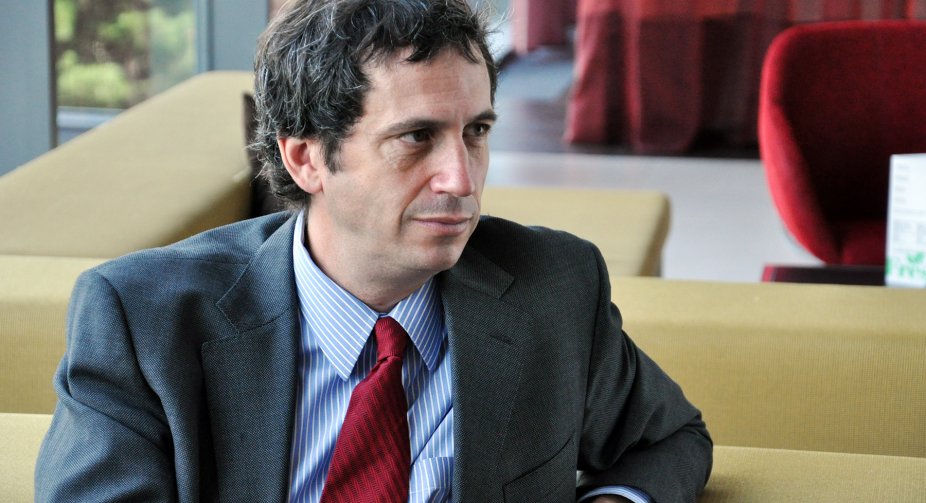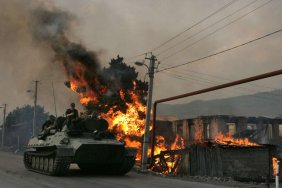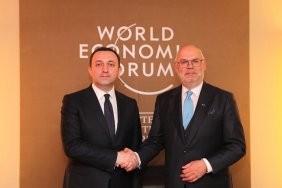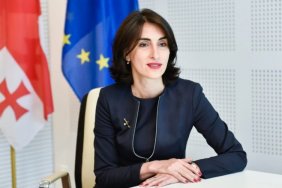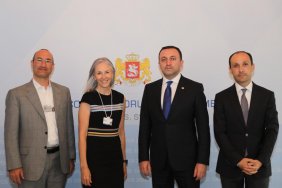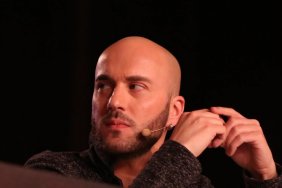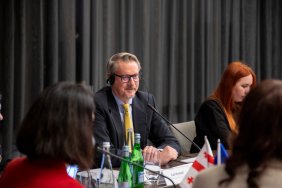Lincoln Mitchell, a political analyst, pundit and writer based in New York City and San Francisco, who works on democracy and governance related issues in the former Soviet Union, Eastern Europe, the Caribbean, the Middle East, Africa and Asia has told Front News in an exclusive interview that former president of Georgia Mikheil Saakashvili, who was arrested in Tbilisi after eight years in political exile, expected far more than he has received from his return.
Mitchell believes that ‘no one has won’ with Saakashvili’s recent move and that the topic also harmed the country’s international image.
The analyst also says that Georgia’s European integration has stalled over the past several years ‘not only because of Georgia,’ and that Saakashvili and the founder of the Georgian Dream party Bidzina Ivanishvili have some similarities.
Front News: Has the Georgian Dream government been able to take major steps towards the country’s Euro-Atlantic integration
Lincoln A. Mitchell: If you asked me this question five years ago, I would have said - yes. The EU-Georgia Association Agreement was a big step forward taken by the Georgian Dream (GD) government while in office. However, progress seems to have stalled over the past few years. To me this is because of two reasons: one that Georgia has not made the progress over the past three to five years that it might have made, reforms also slowed down, and that the EU in the post- Brexit period, and due to its political instability with the US, is less open to add new members. Both parties are responsible- Georgia has not done what it needed to do, and the EU does not seem interested in expanding anyway.
FN : Has the government managed to act in accordance with international standards towards Saakashvili following his arrest?
L.M.: That is a hard question because I do not exactly know what international standards are in this regard. What I see obviously is that it could have been handled better. Saakashvili even now has a much better political mind and a much better mind on how to attract attention than the Georgian government. He went on hunger strike. He certainly attracted attention. But I am not sure when you really drill down on exactly what the Georgian Dream should have done differently. I also want to point out that there is a certain irony here. One of the reasons the UNM lost elections in 2012 was because of horrific, scandalous videos that came out about how the UNM government treated prisoners that time when Georgia was throwing an enormous amount of people into jail for what I would think were minor crimes. I believe that most countries imprison too many people, but there is a certain irony here that the head of that government would complain about being mistreated in prison. I am not saying that this gave anyone the right to mistreat him in prison, but there is an irony in this.
FN : Has Saakashvili’s return and developments around him affected the country’s international image?
L.M.: Yes, everyone loses here. Georgia now looks more unstable, no matter what the background is. Dragging the former president into a car to go to another prison, dragging him out of his cell, his resistance, violence, all these does not look good for the Georgian government. Clearly, after those videos you can not go to Brussels or London or NYC or somewhere and say ‘invest in my country, we are a stable democracy.’ It is just laughable. On the other hand, I do not think Saakashvili got what he wanted. What is striking me is what little attention the world is paying to Saakashvili. I think he thought he would come back, he knew he was going to be arrested and everyone would look and demand his release. The same group of US senators are saying the same things now, who were generally thought to be too close to Saakashvili. There are a few right wing think tanks. There are a few former diplomats (some of whom are very good, some of whom are not), but it has not risen to the kind of issue that he wanted to. Saakashvili needed this to be an abrupt, game changing issue, and it has not happened. I do not know what he expected in terms of how long he would be there, but I think he expected this to somehow change things in Georgia. Now the more this goes on, the longer he stays in jail.
FN : Will Saakashvili’s topic make an influence on Georgian-Ukrainian relations?
L.M.: I think it already has. Even Saakashvili’s return to Ukraine under Volodimyr Zelensky’s presidency created problems in the relationship. Now Saakashvili is in Georgia, in prison and the Ukrainian government is not happy about that. I think this is going to create problems which is very unfortunate because these two countries have a very similar story to tell the world. What is happening in Abkhazia is not the same as what is happening in Donbas, but I believe both are examples of Russian aggression. It would be better if the two countries could speak in one voice.
FN : How do you see the future of the United National Movement opposition party?
L.M.: To answer this question I would go back to the days before Saakashvili returned to Georgia. The concern that the UNM has always had was the losing the position of the most powerful opposition party. They were afraid of the emergence of a stronger opposition party. If in the recent municipal elections former PM Giorgi Gakharia’s party finished too close to the UNM, it would have been bad for the UNM. Saakashvili’s return pushed many Georgians to vote for the ruling party to prevent the return of the UNM and this worked against Gakharia’s party which was likely to have garnered more votes in other situation. Thanks to Saakashvili, the UNM managed to retain the status of the most powerful number two. They are clearly a major opposition force in Georgia. This has been happening for almost a decade now, and they are not getting any closer to the number one even when the GD, in my view, is led by the politicians who are not charismatic and have not ensured the needs of the Georgian people as they should have done. The fear of Saakashvili keeps them in power. The GD and the UNM need each other, or if you want to personalize – it is a dysfunctional relationship between Bidzina Ivanishvili and Mikheil Saakashvili where they both need each other. So, the future of the UNM is: if their goal is to get Ivanishvili and the GD out of power, they have to step back. If their goal is to put themselves back in power, it is going to take a few more years at least.
FN : Does the current political tension in Georgia boost security threats coming from Russia?
L.M.: The Kremlin is looking at this tension in Georgia and they are happy about this. The chaos and weakening of Georgia, slowing the country’s NATO and the EU integration benefits Russia. Does that make Russia more likely to roll tanks down Rustaveli avenue?- no. Does it make it easier for Russia to tighten its grip on Abkhazia and South Ossetia? - absolutely. So, from that perspective, it is a security threat which may make it more difficult for Georgia to reintegrate its territories. Does this mean Russia is going to make a move and invade the rest of Georgia?- in my sense no, because they have already achieved what they wanted.
FN : How can the existing political crisis be solved?
L.M.: My sense is that if we think of Georgia as locked in these dysfunctional fights between the UNM and the GD, then what Georgia needs is a political force that gets them past that. This requires a couple of things: good politics and a kind of dynamic and a charismatic leader. But the problem is both political forces are against this. So, as long as the GD is strong because of its administrative resources, and as long as the UNM is strong because of Saakashvili’s personality, these two can keep fighting and that will make it harder to get out of this crisis. This crisis will not be resolved by one of the parties winning. That is not going to solve the problem.
FN : Do you agree with the Georgian opposition that the country is being informally run by Ivanishvili?
L.M.: There is no doubt. I do not know who would debate that. What I would say is that the term ‘informal’ which the UNM has used for a long time, is a little misleading, because Saakashvili ran the country with informal rule while in office. What I mean is that when Saakashvili was a president, the way people would gain influence was not by their activities, it was how close the individuals were with Misha. Ministers did not have real power, it was what Misha wanted. The main problem with Bidzina is not that he is an informal ruler, he is just unelected. Georgia has a powerful person and he is running the show. The difference is that when you have a president, or a prime minister who is elected, even if they are using their power informally, at least the voters know whom to hold accountable. At least he/she has to go out and face the public.
FN : How would you assess the GD government’s policy towards occupied regions?
L.M.: No one has been able to solve this problem, and neither has the GD. In my sense, this is a very, very confounding problem for Georgia. I do not think that the GD has done a great job, but I do not think they have done a terrible job.
FN : Do you expect the upcoming Eastern Partnership summit will offer something new for Georgia?
L.M.: I think at this moment it would be unlikely, and that may be something that you could attribute to Saakashvili coming back. They want to keep that dialogue open, but I do not expect anything really meaningful and new to come out of it.
FN : What are your expectations on Russia’s actions in Ukraine?
L.M.: From an analytical perspective, If I am Vladimir Putin, my threat of going to war with Ukraine is very valuable. If the world thinks I might invade Ukraine further, if the world thinks I might do that, that is good for Russia. But to actually take the step, I do not think that is good for Russia. There are a lot of Ukrainians that will resist. Taking the step will cost much for Russia in terms of money and human lives over time. What Russia has done so far, since 2014, is to destabilize Ukraine a little bit, creating problems. They can keep doing that forever. I mean, I do not want them to do that forever, obviously, but that is what I would be thinking if I were Russia. But what does that mean for the west? You can not just let them get away with threatening and building up troops. It is a very difficult conundrum for the US and for the western allies, because on the one hand, they want to send a message to Putin that this is not right, and on the other hand, they do not actually want the war. So, they have to navigate through that.
Front News - Georgia
Giorgi Kratsashvili
